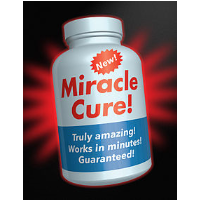The Strange Growing Effectiveness of Placebos
 (photo: Wikipedia)
(photo: Wikipedia)
It turns out that positive thinking—or just being an American—might have as much healing power as pharmaceuticals.
The placebo effect appears to be increasing, making it more difficult for drug manufacturers to determine whether their latest creations are actually doing patients any good. And a new study has shown that the phenomenon is most prevalent in the United States, according to the BBC.
Researchers at Canada’s McGill University found that just taking part in clinical trials in the United States has a healing effect. There’s no clear reason why this might be so, although the advertising to consumers of prescription drugs, which isn’t allowed in most other countries, might play a part. Researcher Jeffrey Mogil said that the size of the U.S. trials might also be a factor. Larger, well-funded trials might give the outward appearance to participants that the researchers are on to something.
“There’s been a push to gather data, not have missing data,” Dr. John Farrar, a neurologist and epidemiologist at the University of Pennsylvania, told the BBC. “So a lot more attention has been paid to patients, there’s a lot more contact with patients to make sure they fill out the forms in the right way, and a general increase in knowledge about the potential activity of the drug—talking about the science of it, how it might work, etc. And one can assume that all of that leads to potentially a higher expectation in patients.”
Some patients also enroll in trials because of a financial benefit. They may exaggerate their symptoms to gain entrance to the trial, then as it continues, their “symptoms” disappear. That might be attributed by researchers to a placebo effect.
Sometimes placebos work even when a patient knows he or she is getting one. A study cited by Mercola.com reported that 60% of patients with irritable bowel syndrome who knew they were getting a placebo still reported a relief of symptoms, compared to only 35% who received no treatment at all.
The Food and Drug Administration (FDA) requires that all new drugs undergoing clinical trials be tested for the placebo effect. Participants’ responses to the placebos are weighed against their responses to the actual drug. The totality of positive responses to the placebos is subtracted from that of the real drug. If the result does not show that the drug has substantially outperformed the placebo, that outcome could prevent the FDA from approving the drug to go to market. The increasing effectiveness of placebos in treating patients’ conditions are consequently making it more difficult for new drugs to pass clinical trials, much to the consternation of pharmaceutical companies which, according to the BBC, often spend in excess of $1 billion to develop their product.
-Steve Straehley
To Learn More:
Why Are Placebos Getting More Effective? (by William Kremer, BBC)
Placebo Effect Has Risen Among Americans, Making Drug Development More Difficult (by Dr. Joseph Mercola, Mercola.com)
- Top Stories
- Unusual News
- Where is the Money Going?
- Controversies
- U.S. and the World
- Appointments and Resignations
- Latest News
- Musk and Trump Fire Members of Congress
- Trump Calls for Violent Street Demonstrations Against Himself
- Trump Changes Name of Republican Party
- The 2024 Election By the Numbers
- Bashar al-Assad—The Fall of a Rabid AntiSemite






Comments